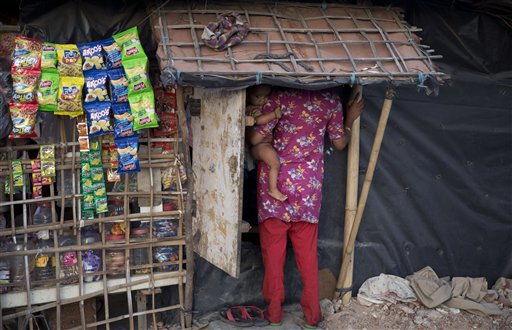
A Rohingya refugee woman, an ethnic persecuted Muslim minority fleeing Myanmar a predominately Buddhist nation, holds a baby as she speaks to a store owner on the outskirts of New Delhi, India, Thursday, Sept. 3, 2015. According to the United Nations refugee agency (UNHCR), there are around 9,000 Rohingya registered in the capital with thousands more unregistered ones living in different parts of the country. AP
BLANG ADOE, Indonesia — More than 200 ethnic Rohingya stormed out of an Indonesian encampment Tuesday as tensions erupted following alleged rapes and beatings by locals at the site where members of Myanmar’s long-persecuted minority have been held since arriving four months ago by boat.
The incident occurred after authorities forced one of the females to go to a hospital. Other Rohingya did not want her to leave, fearing she could be abused more if separated from the group, said Steve Hamilton, deputy chief of mission at the International Organization for Migration, who was at the scene.
That “caused some panic and a brief chaotic response, with Rohingya trying to stop the ambulance,” he said.
Four females and six males, aged 14 to 28, said they were attempting to flee the camp Monday night because they wanted to go to neighboring Malaysia, where a large community of Muslim Rohingya exists, Hamilton said. They alleged they were stopped not far from the camp by a group of Indonesian men with masks and taken into the woods, where they were beaten and three of the females were raped, including a 14-year-old.
“We very much regret this incident and will definitely thoroughly investigate it,” said Amir Hamzah, a spokesman for the district government in North Aceh. He said the females were traumatized and wanted to seek medical attention, but were stopped when Rohingya men in the camp insisted they stay.
Immigration officials were working to identify everyone who returned to the camp Tuesday night after the tensions calmed, and some women were being examined at the hospital, said North Aceh Deputy Police Chief Maj. Irsyad Haryadi.
“We are still investigating this serious case while waiting for the hospital results,” he said. No arrests have been made, and Haryadi said it was difficult to find witnesses to corroborate the story.
Since Myanmar opened up following a half-century of military rule in 2011, an estimated 130,000 Rohingya have fled violence and persecution, sparking the largest boat exodus in Asia since the Vietnam War. Earlier this year, the situation spiraled after a crackdown on people smugglers in Thailand and Malaysia left thousands of Rohingya and Bangladeshis stranded at sea when their agents and captains, fearing arrest, abandoned them.
Several countries in the region refused to allow the boat people to come ashore in May, worried that opening the door to a few would invite a massive influx.
Under international pressure, Indonesia and Malaysia finally allowed the boats to land and said they would temporarily host those on board until a more permanent solution could be found.
Hundreds of Rohingya ended up in Indonesia, but it was never their intended destination. They are being held in camps, cannot work and are separated from family members, including those living in Malaysia. TVJ